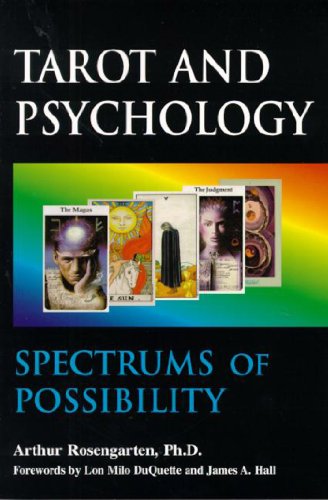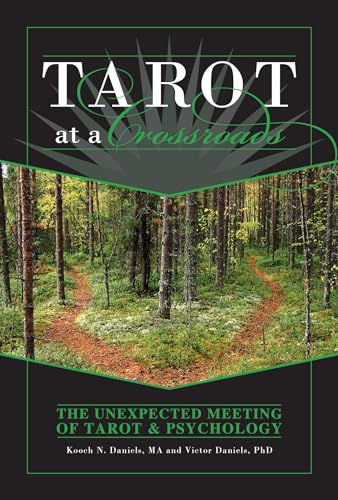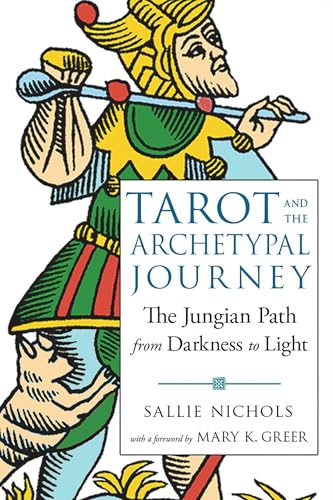Tarot and Psychology represent a whole new level of clinical psychology. The readers will be mesmerized just by reading the cards of this deck. This Tarot and Psychology Review is meant to be a hub for those interested in learning about Tarot and Tarot reading.
It will drag the readers into a world full of challenges and thrills with the outstanding psychological facts of the human mind.
Here is a review article on the Tarot and Psychology, which shows its specification, pros, and cons and what previous users say about this tarot.
What does this Deck Mean?
“Tarot and Psychology” is a self-help book that discusses how tarot cards can be used as a tool for understanding one’s strengths and weaknesses and to be able to accept yourself. The book is written by Arthur Rosengarten, Ph.D., who has written more than a dozen books.
There are many ways to help people, and Tarot is one of them. Rather than only predicting what’s going to happen in the future, Tarot’s focus is on what’s already happened, what people have already experienced. Through Tarot, we can learn about ourselves and others. A tarot reading can be used in therapy, coaching, counseling, researching, and more.
What is the Shadow in Jungian Psychology?
A school of psychology developed from Carl Jung’s work called Jungian psychology. Jung believed that the unconscious mind possessed a shadow side that continually strives to break free. This side of the personality is often represented by the shadow person, representing a person’s innermost fears, weaknesses, and other undesirable aspects.
The Shadow is the dark side of the personality, the part of ourselves that we keep hidden from ourselves, others, and the world.
We all have a Shadow, which is usually a part of us that we find disgusting or shameful. It is the part of us that we don’t want the world to see, that we want to hide.
The Shadow is sometimes called the “dark side” of the personality, the “shadow side” of our “whole” self, or the “shadow self” of the personality. It is believed that the Shadow is a major influence on the person’s behavior and that it is the key factor in causing inner conflicts and emotional pain.
- Rosengarten Ph.D, Arthur (Author)
- English (Publication Language)
About the Writer
Dr. Arthur Rosengarten is a certified medical psychologist and a renowned Tarot analyst and educator with twenty-five years of knowledge in both areas. He also had a diploma from American Psychotherapy Association. He has given numerous talks on the psychology of the Tarot, including at top programs in the United States, China, and India. Moreover, he presently serves in Encinitas, California, as an individual practitioner.
Tarot and Psychology: Spectrums of Possibility Review
Through Tarot divination, this book offers a method for comprehending human consciousness’s spiritual and psychological potential. This is a book that is both competent for clinical psychologists and practicing Tarot users to get challenged. This work is based on the author’s significant clinical research experience and his rigorous clinical practice.
- This book will provide counseling through the author’s clinical knowledge about psychology.
- The book provides amazing explanations to make the readers get used to it.
This book was written by Arthur Rosengarten and published by Paragon House on April 7, 2000. The book’s format is in paperback form, and the book language is English which also owns 312 pages in total. The item’s weight is 14.9 ounces. The book dimensions are 5.98 x 0.68 x 9.04 inches.
Previous Readers’ Experiences:
- This book was published with psychologists and counselors in mind.
- If the users do not have a foundation in psychology, they may need to read the complete book before using any of the ideas.
- According to critics, even for somebody who is versed with psychological knowledge, several of the segments looked somewhat academic and unclear.
- The book’s first half was fantastic.
- In the second half of the book, things get more unbalanced.
- It forces readers to think about something they like regarding tarot and explore how they perceive it as a therapeutic tool.
- Within the work context, the author’s “daily” allusions and background elucidate, obviating the need for repeated journeys to the glossary.
| Pros: | Cons: |
|---|---|
|
|
Conclusion:
Tarot provides a wide range of mental and emotional possibilities available to consciousness, regardless of the user’s credentials or convictions. Tarot, one would argue, spontaneously catches the essence of existence. This fact itself should make the array of human possibilities instantly applicable to those who regularly work with the heart rhythm of life. The readers will have a great time with it.
You May Also Like:
- Dark Mirror Oracle Cards Deck Review & Guide
- Star Spinner Tarot Deck- Review
- Dark Passenger Psychology: How Real is the Idea
- Popular Dark Tarot Card Combinations
- Dark Psychology Secrets to Mind Control
- Dark Psychology | How to manipulate people’s minds
Last update on 2026-01-13 / Affiliate links / Images from Amazon Product Advertising API





